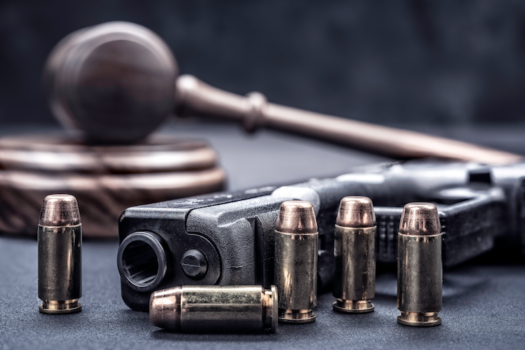
In State v. Timothy J. Canfield (A-53-21/086644) (Decided January 11, 2023), the Supreme Court of New Jersey held that the trial court did not err in failing to instruct the jury to consider a lesser charge of passion/provocation manslaughter. However, it declined to adopt a procedural rule proposed by the Appellate Division that would have required that the appropriateness of a passion/provocation manslaughter instruction be considered first by the trial court.
Facts of State v. Canfield
In January 2013, defendant Timothy J. Canfield shot and killed K.P., his sister-in-law’s former boyfriend. Defendant claimed that he acted in self-defense. He testified that K.P., who was HIV-positive, came towards him during their argument while holding an object that defendant believed to be a hypodermic syringe. Defendant was charged with first-degree murder.
At the charge conference, defendant objected to giving any instruction on lesser-included offenses, but the trial court charged the jury on aggravated and reckless manslaughter. Defendant did not request an instruction on passion/ provocation manslaughter, and the court did not instruct the jury, sua sponte, on that lesser-included offense. The jury acquitted defendant of murder but convicted him of the lesser-included offense of aggravated manslaughter, among other offenses.
The Appellate Division held that it was not plain error for the trial court not to give the passion/provocation manslaughter instruction because even accepting defendant’s version of the fatal confrontation, that instruction was not clearly indicated. However, the appellate court proposed a measure to ensure that the appropriateness of a passion/provocation manslaughter instruction be considered first by the trial court.
The Appellate Division recommended a new procedural rule: “when, in a murder prosecution, the trial court determines to instruct the jury on self-defense at the charge conference . . . , the court should also consider and make specific findings on the record as to whether to instruct the jury on the lesser-included offense of passion/provocation manslaughter, regardless of whether either party has requested that instruction.” To implement its proposed rule, the Appellate Division recommended that the model jury instructions for murder, aggravated manslaughter, manslaughter, and self-defense be reviewed.
NJ Supreme Court Decision in State v. Canfield
The New Jersey Supreme Court affirmed as the Appellate Division’s judgment substantially for the reasons stated in Judge Ronald Susswein’s “thoughtful and thorough opinion.” However, it did not find that the Appellate Division’s proposed procedural rule was necessary.
In its opinion, the New Jersey Supreme Court cited the Appellate Division’s discussion of the different standards that may apply depending on whether the defendant requests a lesser-included offense instruction. As the court explained, f the defendant requests such a charge, the trial court must include it if, viewing the evidence in the light most favorable to the defendant, there is a rational basis in the record for doing so. However, if the defendant does not request a lesser-included offense charge, the instruction is only required if “clearly indicated” by the facts in evidence.
The New Jersey Supreme Court went on to conclude that it was not plain error for the trial court not to give a passion/provocation instruction sua sponte, agreeing that the defendant’s version of the events fails to meet the ‘clearly-indicated’ standard as to have required a jury instruction on passion/provocation manslaughter sua sponte.” The court explained:
As the Appellate Division persuasively detailed, defendant did not testify that he was involved in any previous physical fight with K.P. Ibid. Although he testified he believed that K.P. was holding a syringe, he did not say that K.P. threatened to use the syringe as a weapon, had previously “assaulted anyone with a syringe[,] or had ever explicitly threatened to do so.” According to defendant, K.P. began approaching from thirty feet away. Ibid. Defendant did not testify that K.P. was running at him, was “close enough to have used a syringe as a weapon,” or was “holding the object in his hand as if preparing to strike with it.”
The New Jersey Supreme Court declined to adopt the Appellate Division’s proposed procedural rule. In support, the court cited that the Appellate Division, parties, and amici only cited three published cases in the past three decades in which a jury verdict was reversed because the court’s failure to instruct the jury on passion/provocation manslaughter sua sponte was found to be plain error. “Given the apparent infrequency of such plain errors, we do not view the Appellate Division’s proposed procedural rule to be critical to protecting otherwise valid jury verdicts from reversal,” the court wrote.
The New Jersey Supreme Court also noted that the “clearly indicated” standard was specifically created by appellate courts and is more appropriately a tool of post-verdict and appellate review. “Because we believe the current practice correctly balances the interests of the prosecution, the defense, and the public, we decline to adopt the proposed rule,” the court wrote.
